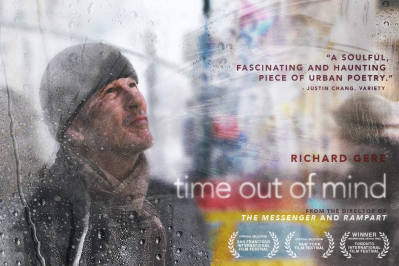Common Homelessness Myths and Facts

The National Alliance to End Homelessness has come up with a discussion guide for Richard Gere’s new movie, “Time Out of Mind,” a very realistic look at the life of a chronically homelessness man in his struggles to reunite with his daughter. The discussion guide highlights many Myths and Facts about homelessness and brings up some very interesting and relevant information:
Ever wonder what to do when you pass someone on the street that is homeless?
There is something very simple you can do to help; educate yourself and your elected representatives. There are a lot of myths about homelessness. Check out the facts.
MYTHS AND FACTS
MYTH: The people you see on the street make up the majority of the homeless population.
FACT: The people you see on the street actually make up less than 15 percent of the total homeless population. These individuals experience what is called “chronic homelessness,” or long term homelessness, and are usually disabled in some way. Because they are living on the streets or in shelter for long periods of time they are more vulnerable and therefore consume the majority of the resources dedicated to helping the homeless.
MYTH: People who are homeless and use drugs are not going to stay in housing.
FACT: The majority of people with substance use disorders that are placed in housing actually remain housed for long periods of time. In general, around 70 percent of those housed wind up staying housed.
DuPagePads Supportive Housing Program, (for people with a documented disability due to a physical or mental condition or addiction and have been homeless for a year or longer) last year saw 91% of our participants remain housed for a year or longer.
MYTH: There will always be homeless people on the street, right?
FACT: No. The solution is simple and it works. It’s called supportive housing and it saves communities money as well as helps people get off the streets.
MYTH: It would cost way too much to fix this problem. How can we afford to house everyone?
FACT: It may seem like an insurmountable problem but actually, it would only take 25,500 additional housing units to end chronic homelessness nationally. That’s $345 million dollars, or less than 1 percent of the Department of Housing and Urban Development’s annual budget.
Currently DuPage Pads has 80 Supportive Housing apartments in the community and would need approximately 150 more units to end chronic homelessness in DuPage County. According to the Illinois Housing Development Authority’s 2013 annual report, Illinois taxpayers save $37,000 each year for every adult in Supportive Housing and out of a nursing home or institution. Using those numbers, last year DuPage Pads 80 Supportive Housing units saved taxpayers $2,960,000; all while improving the health and well-being of those served.
MYTH: Homeless people on the street choose that life.
FACT: The vast majority of chronically homeless people are extremely vulnerable, have disabling conditions, were victims of abuse, and do not have the benefit of supportive relationships with capacity to help.
MYTH: As a normal, everyday citizen there is nothing I can do.
FACT: Your voice matters. If you are fed up with homelessness, call your representatives and remind them that there is a cost effective solution already being developed in the majority of communities. Tell them to support a $345 million dollar increase (to $2.480 billion) to the McKinney-Vento Homeless Assistance Grants program in the final FY 2016 spending bill.
If you would like to help end homelessness locally, consider donating to DuPage Pads and our solution – housing coupled with support services and employment. Learn about different ways to get involved here.

Here are recommended additional resources:
- Snapshot of Homelessness in America – http://www.endhomelessness.org/pages/snapshot_of_homelessness
- Background – http://www.endhomelessness.org/library/entry/fact-sheet-chronic-homelessness1
- Solutions – http://www.endhomelessness.org/page/files/2685_file_Chronic_Homelessness_Policy_Solutions.pdf
- What is ‘housing first’ – http://www.endhomelessness.org/pages/housing_first
- ‘Opening Doors’: the Federal Strategic Plan – http://usich.gov/opening_doors/
